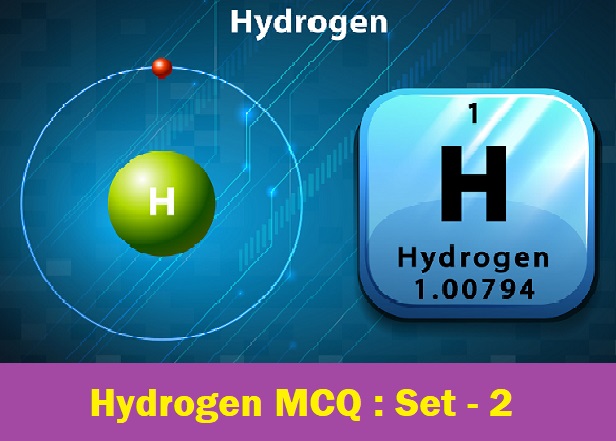CBSE Class 11 Chemistry Chapter 9 Hydrogen Multiple Choice Questions with Answers. MCQ Questions Class 11 Chemistry Hydrogen with Answers was Prepared Based on Latest Exam Pattern. Students can solve NCERT Class 11 Chemistry Hydrogen MCQs with Answers to know their preparation level.
Students who are searching for NCERT MCQ Questions for Class 11 Chemistry Hydrogen with Answers are compiled here to get good practice on all fundamentals. Know your preparation level on MCQ Questions for Class 11 Chemistry with Answers. You can also verify your answers from our provided MCQ Class 11 Chemistry Hydrogen with Answers. So, ace up your preparation with MCQ of Chapter 9 Chemistry Objective Questions.
MCQ Questions Class 11 Chemistry Hydrogen with Answers - Set - 2
Question 1:
The property of hydrogen which distinguishes it from alkali metals is
(a) its electropositive character
(b) its affinity for non metal
(c) its reducing character
(d) its non-metallic character
Correct Answer – (D)
Question 2 :
Hydrogen is most __________ element in the universe.
(a) Abundant
(b) None
(c) Both
(d) Consumer
Correct Answer – (A)
Hydrogen is considered as the most common and abundant element. The element Hydrogen has only one proton and one electron and is the only element which has no neutrons. Therefore it is considered as the simplest element in the universe and gives a valid reason for it to be the most abundant and common element in the universe. As per estimation from the Jefferson Lab, approximately 90 percent of the visible universe is framed by Hydrogen proving that being in the simplest form, this element is the most common and abundant element in the universe
Question 3 :
Hydrogen is a good __________ agent.
(a) Oxidizing
(b) Reducing
(c) Acidic
(d) Basic
Correct Answer – (B)
Question 4 :
What is gram equivalent weight of hydrogen peroxide as reductant?
(a) 100
(b) 125
(c) 152
(d) None of the Above
Correct Answer – (C)
As reductant hydrogen peroxide oxidises to oxygen. H2O2 → O2
The change in oxidation number is 2
The molar mass = 34 g
Gram equivalent weight of H2O2 = (34/2)
Equivalent weight = 152
Question 5 :
The freezing point of heavy water is
(a) 0°C
(b) 3.8°C
(c) 4°C
(d) 1°C
Correct Answer – (B)
MCQ Questions Class 11 Chemistry Hydrogen with Answers
Question 6 :
Hydrogen can behave as a metal
(a) at very high temperature
(b) at very low temperature
(c) at very high pressure
(d) at very low pressure
Correct Answer – (C)
Question 7 :
The volume of 10 volume H2O2 required to liberate 500 ml of O2 at S.T.P. is :
(a) 25 ml
(b) 50 ml
(c) 100 ml
(d) 125 ml
Correct Answer – (B)
Therefore, 500 ml of O2 is obtained at STP = 50 ml
Question 8 :
Hydrogen is the most abundant element on earth after______.
(a) Oxygen
(b) Carbon
(c) Sulphur
(d) None of the Above
Correct Answer – (A)
The mass-abundance of the nine most abundant elements in the Earths crust is approximately: oxygen 46%, silicon 28%, aluminium 8.2%, iron 5.6%, calcium 4.2%, sodium 2.5%, magnesium 2.4%, potassium, 2.0%, and titanium 0 .61%.
Hydrogen is 0.14% on earths crust and other elements occur at less than 0.15%
Question 9 :
_________________ on water decolourises H2O2
(a) O3
(b) Acidic KMnO4 solution
(c) Black Suspension of Lead Sulphide(PbS)
(d) None of these.
Correct Answer – (C)
Lead sulphide (black suspension) on reaction with hydrogen peroxide forms lead sulphate and water. Lead sulphate as well as water are colourless, therefore lead sulphite decolourises on addition of hydrogen peroxide.
PbS(s) + 4H2O2 (aq) → PbSO4 (s) + 4H2O (aq)
Question 10 :
Hydrogen has isotopes
(a) 2
(b) 3
(c) 4
(d) 5
Correct Answer – (C)
Hydrogen has three main isotopes; Protium (1H), deuterium (²H) and tritium (³H). These isotopes form naturally in nature. Protium and deuterium are stable. Tritium is radioactive and has a half-life of about 12 years. Scientists have created four other hydrogen isotopes (4H to 7H), but these isotopes are very unstable and do not exist naturally.
The main isotopes of hydrogen are unique because they are the only isotopes that have a name.
- NCERT Solutions Class 11 Chemistry Chapter 1 : Some Basic Concepts of Chemistry
- NCERT Solutions Class 11 Chemistry Chapter 2 : Structure Of The Atom
- NCERT Solutions Class 11 Chemistry Chapter 3 : Classification of Elements and Periodicity in Properties
- NCERT Solutions Class 11 Chemistry Chapter 4 : Chemical Bonding and Molecular Structure
- NCERT Solutions Class 11 Chemistry Chapter 5 : States of Matter
- NCERT Solutions Class 11 Chemistry Chapter 6 : Thermodynamics
- NCERT Solutions Class 11 Chemistry Chapter 7 : Equilibrium
- NCERT Solutions Class 11 Chemistry Chapter 8 : Redox Reactions
- NCERT Solutions Class 11 Chemistry Chapter 9 : Hydrogen
- NCERT Solutions Class 11 Chemistry Chapter 10 : The s-Block Elements
- NCERT Solutions Class 11 Chemistry Chapter 11 : The p-Block Elements
- NCERT Solutions Class 11 Chemistry Chapter 12 : Organic Chemistry: Some Basic Principles and Techniques
- NCERT Solutions Class 11 Chemistry Chapter 13 : Hydrocarbons
- NCERT Solutions Class 11 Chemistry Chapter 14 : Environmental Chemistry



